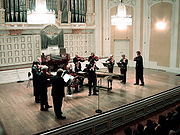The field of music cognition involves the study of many aspects of music including how it is processed by listeners. Rather than accepting the standard practices of analyzing, composing, and performing music as a given, much research in music cognition seeks instead to uncover the mental processes that underlie these practices. Also, research in the field seeks to uncover commonalities between the musical traditions of disparate cultures and possible cognitive "constraints" that limit these musical systems. Questions regarding musical innateness, and emotional responses to music are also major areas of research in the field.
Deaf people can experience music by feeling the vibrations in their body, a process which can be enhanced if the individual holds a resonant, hollow object. A well-known deaf musician is the composer Ludwig van Beethoven, who composed many famous works even after he had completely lost his hearing. Recent examples of deaf musicians include Evelyn Glennie, a highly acclaimed percussionist who has been deaf since age twelve, and Chris Buck, a virtuoso violinist who has lost his hearing. This is relevant because it indicates that music is a deeper cognitive process than unexamined phrases such as, "pleasing to the ear" would suggest. Much research in music cognition seeks to uncover these complex mental processes involved in listening to music, which may seem intuitively simple, yet are vastly intricate and complex.
from: Wikipedia.org


Tidak ada komentar:
Posting Komentar